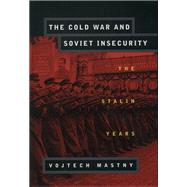The Cold War and Soviet Insecurity The Stalin Years
, by Mastny, Vojtech- ISBN: 9780195126594 | 0195126599
- Cover: Paperback
- Copyright: 10/8/1998
The child of a small coup rather than an extension of popular will, theSoviet State was intrinsically insecure, its leaders ever fearful of internaland external threats. They did not feel that their regime would be safe untilthe revolution triumphed abroad, convinced that the outside world was implacablyhostile. None felt this more strongly than Stalin. Indeed, as eminent historianof the Soviet Union Vojtech Mastny argues, it was Stalin's insatiable cravingfor security, more than anything else, that was the root cause of East-Westtensions and the Cold War.In The Cold War and Soviet Insecurity, the long-awaited sequel to hisacclaimed work, Russia's Road to the Cold War, Mastny offers a masterful historyof the birth of the Cold War, drawing on extensive research in newly openedSoviet archives. Here Stalin takes center stage during the critical years 1947to 1953, stamping East-West tensions with his personal blend of paranoia,ideology, ruthlessness, and wishful thinking. Indeed, given Stalin's personalityand his unquenchable thirst for security, Mastny argues, the Cold War arose asan "unexpected but predetermined" event--far from planned, yet scarcelyavoidable. As Mastny unfolds the history of this climactic era, he offers a newunderstanding of important aspects of the developing conflict--throwing sharplight, for example, on the Kremlin's relationship with foreign Communist parties(in both Eastern and Western Europe) and its very different responses to Titoand Mao. Indeed, the break with Tito demonstrates the depths of Stalin'sparanoia: the Yugoslav leader actually thought he was doing Stalin's will, whenall along his very similarity to Stalin alienated the Soviets--a case of"incompatible affinities," as Mastny writes. Here too is a fresh view of theoutbreak of the Korean War: Stalin not only approved the attack, he activelyarmed and prepared the North's Communist army. And yet, he strangely left themost crucial war decisions to the North Koreans. Mastny brilliantly analyzesthese events, showing the impact of the fighting in Korea on Europeanrelations--especially the question of divided Germany. And throughout thevolume, Mastny offers many thought-provoking observations--he shows, forinstance, that U.S. covert operations (especially the attempted infiltration ofarmed agents into Eastern Europe) may have had greater historical impact, byreinforcing Stalin's paranoia, than the better-known Soviet espionage efforts inthe West; and that the West's failure to exploit instability--especially in EastGermany--after Stalin's death, may have allowed a shaky Soviet regime to regainits footing and survive for another forty years.Russia's Road to the Cold War provided the definitive portrait of Stalin'sforeign policy during World War II. Now, in The Cold War and Soviet Insecurity,Mastny provides an equally superb account of Stalin's foreign policy during hislast years. Combining important new research with the fascinating insight of oneof the leading authorities on Soviet affairs, this authoritative volumeilluminates a crucial period in recent world history.







